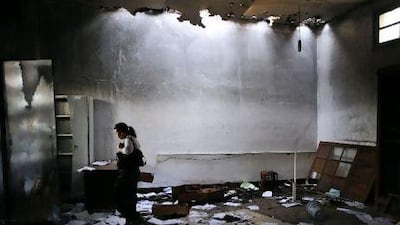MENZEL BOURGUIBA // On a balmy evening two weeks ago, a mob in this industrial town set fire to a police station, stole weapons and sent four policemen to the hospital.
"They pulled one into the street and beat him," said Farid Ghaba, a truck driver who watched from his mother's house opposite the station. "Most of them were just kids."
Video: Post-revolutionary Tunisia: A woman's voice
A young woman's hopes and fears of the future in the post-revolutionary and politically undefined Tunisia.
The attack was part of a weekend of turmoil across Tunisia that left a teenager dead as security forces struggled to suppress riots.
While triggered by a police crackdown on protesters, the violence has deeper roots: social pressures, unemployment and longstanding distrust between police and populace.
Those conditions persist despite the overthrow of Zine el Abidine Ben Ali in January. Protests have since prompted reshuffles of the interim government and finger-pointing by political leaders.
Last week, prime minister Béji Caid Essebsi accused unnamed agitators of seeking to derail October's elections, while the interior ministry said that Islamists were behind the recent violence.
Trouble began when protesters marched on Mr Essebsi's office in Tunis on July 15, demanding trials for officials accused of complicity in demonstrators' deaths in January. Police responded with tear-gas as protesters fled to a nearby mosque.
The next day riots erupted in cities around the country. An interior ministry statement blamed "extremists" for rioting and arson in Jbeniana, Kairouan, Sousse, Hammam Ghezaz, Sers, Negra and two suburbs of Tunis.
In Menzel Bourguiba, Mr Ghaba watched hundreds of rioters attack the police station, a former nursery school converted after other stations were vandalised. Some rioters wore beards common among conservative Muslims, "but most were hooligans," he said.
"They had a red bottle full of petrol, which they poured all over the garden," said Jamila Ghaba, Mr Ghaba's mother. "Then they climbed up on the roof and poured it there, too."
As the station burned, the attackers looted it. The station's four policemen were taken to hospital to be treated for burns, said Taieb Nefzi, Menzel Bourguiba's mayor, while looters stole three Steyr rifles and a Berretta pistol. Rioters also vandalised municipality offices and an office of the state health insurance agency, he said.
While the attackers are unknown, residents and officials say that tension in Menzel Bourguiba has been mounting for decades.
A half-century ago the town was known as Ferryville, after French imperial enthusiast Jules Ferry, and Frenchmen outnumbered Tunisians. The ghost of France remains in a converted church and streets lined with sycamores.
Equipped with port infrastructure to serve a French military shipyard, Menzel Bourguiba became an industrial hub after Tunisia gained independence in 1956.
People from other regions arrived to seek work, eroding community life, said Faouzi Benaissa, president of the chamber of commerce in the regional capital, Bizerte. "Today Menzel Bourguiba is made of small heterogeneous groups. Unemployment has gone up, and so has youth delinquency."
Poor suburbs have sprouted, with featureless housing blocks and sandy yards where young men loiter - common targets of harassment by police during Mr Ben Ali's 23-year rule.
"You'd just be walking in the street and police would stop you," said Mehdi Hadly, 25, an unemployed engineering graduate from Hay Ennajah, a working-class district. "The bureaucracy was incredibly slow, and many people demanded bribes."
A cocktail of malaise and resentment has exploded several times since January, most recently with the attack on the police station on July 16.
The following night, police launched night raids into districts including Hay Ennajah, where Mr Khachroum said that he saw three policemen escort a bearded young man from his house.
"There was a women's voice from the house crying, 'Let him go! Let him go!'," Mr Khachroum said. Two police vans were parked nearby, both loaded with men who appeared to have been arrested, he said.
Meanwhile in the town of Sidi Bouzid that night, a 14 year-old boy was killed by gunfire as soldiers dispersed protesters. Authorities said that the bullet was a ricochet from shots fired in the air.
On July 18 police again raided Hay Ennajah, Mr Hadly said, firing tear gas at gangs of stone-throwing youths. Mr Nefzi, the mayor, said that police had detained but released 39 people as of last Friday, but that he had no further information.
Today Menzel Bourguiba remains under a loose curfew, with residents gingerly venturing outdoors at night as police patrols cruise the streets.
It remains to be seen whether trust will grow between police and the young people who loathe them.
"Maybe with time it can happen," Mr Hadly said. "Maybe."

